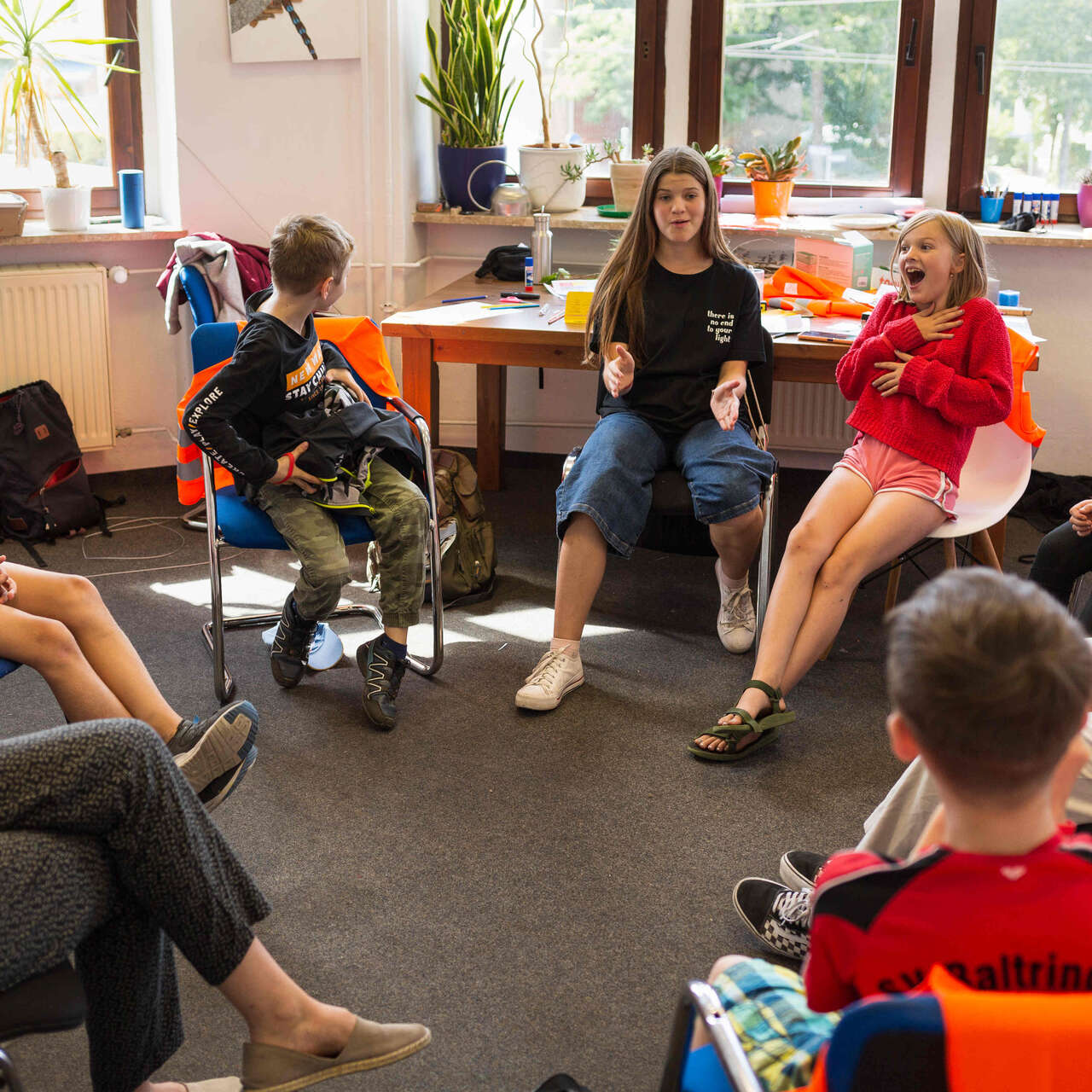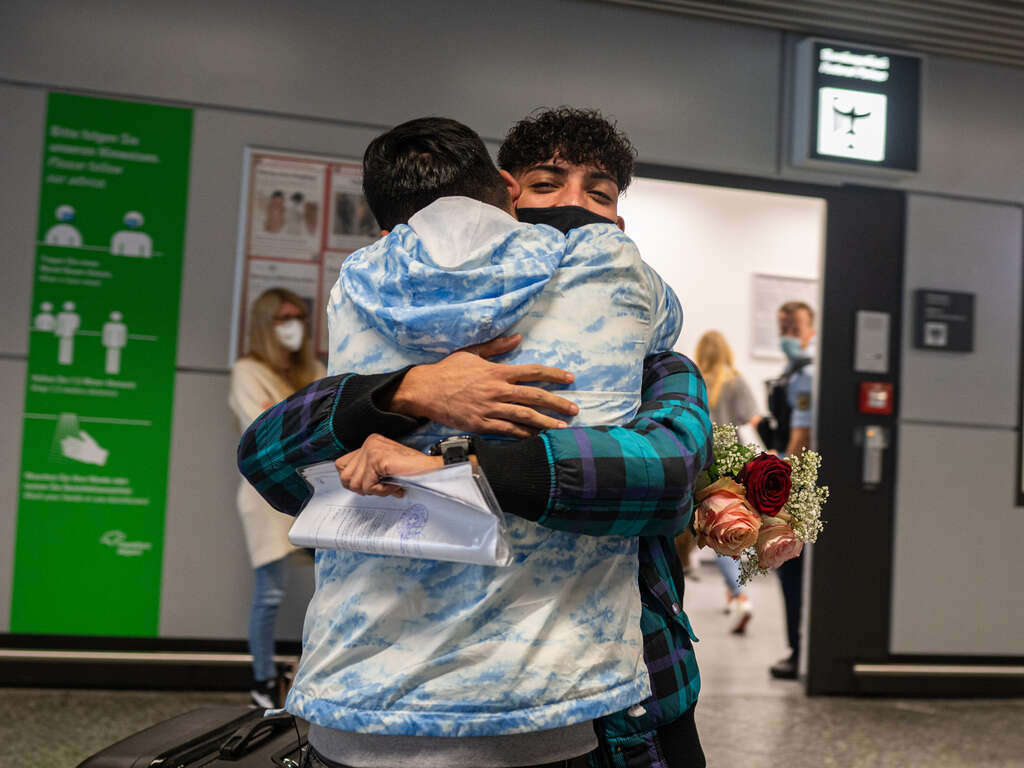Join us for 4 days/5 nights to see the International Rescue Committee’s (IRC) programs in Germany!
ARRIVAL: November 17, 2024
DEPARTURE: November 22, 2024
Context
In Europe, we work in contexts of transit and destination countries. Germany, for many, is a destination country where clients arrive seeking temporary or permanent stays.
The International Rescue Committee is supporting clients who seek refuge in Germany directly as well as government and local nonprofit agencies who assist them. We're sharing our expertise in education for refugee children and youth, the special protection needs of women fleeing crisis, and ways to prepare refugees to join the workforce and contribute to their new communities.
In the last two years alone, around 1.1 million people fleeing the war in Ukraine came to Germany, making it the largest host nation of Ukrainian refugees in Europe.
THE IRC IN GERMANY
- Chapters
- descriptions off, selected
- captions settings, opens captions settings dialog
- captions off, selected
This is a modal window.
Beginning of dialog window. Escape will cancel and close the window.
End of dialog window.
IRC Germany is the IRC’s European headquarters, combining a country program implementing integration projects for refugees and other vulnerable populations in Germany, with representational functions of IRC’s global work vis-à-vis the German government and other German and European stakeholders and raising funds for project work worldwide. Established in 2016, IRC Germany now employs a dynamic team of approx. 200 staff across two offices in Bonn and Berlin, and remote across the country.
In our programs, around 100 staff members currently work from 18 cities across the country and deliver program services in 14 out of 16 of Germany’s federal states, plus additional nationwide online services.
*Please note that some of the links below are in German. By using a translation tool in your browser, you can translate the text to another language. *
- IRC trains educators from kindergarten to secondary school to create a safe and open learning environment for refugee children in Germany - using, among other tools, the Healing Classrooms innovative educational approach.
- Healing Classrooms promotes social-emotional learning and proficiency in reading, math, and other subjects, while addressing the demands of education in the digital age.
- The aim of IRC Germany's Safety and Empowerment program is to help refugees in Germany live in safety and be able to mentally process experiences of violence, discrimination and oppression in order to participate autonomously in social life again.
- IRC offerings include: parenting groups, storytelling workshops, facilitated adolescent girl groups.
- IRC supports refugee adults entering the German labor market through career training, orientation and upskilling.
- IRC offerings include: Individual skills assessment and career planning, Placement in open positions, Needs-based support for refugee women.
- IRC Germany's Safety and Legal Protection program supports refugees in finding safe and legal routes to Germany and to help ensure that they live in safety in Germany, know their rights and are supported in implementing them.
- Our program includes: Information for potentially affected persons of trafficking and prevention work for non-specialized institutions, Legal support for Afghan citizens as part of the Federal Admissions Program Afghanistan.
TENTATIVE ITINERARY
Day 1: Sunday, November 17, Frankfurt/Mannheim
- Arrive in Frankfurt, Germany.
- Transfer to Mannheim.
- Welcome Dinner.
Day 2: Monday, November 18, Mannheim
- Visit to IRC programs with the focus on empowerment of girls and youth/young adults.
- Engage with stories and participants of the “No Single Story” workshop - a women’s empowerment program encouraging female clients to tell their stories.
- Dinner and discussion on women and girls' programs.
Day 3: Tuesday, November 19, Heidelberg
- Transfer to Heidelberg.
- On-site visit of a government arrival center for asylum-seekers in Heidelberg.
- Lunch in Heidelberg with team members and discussions on IRC’s work for families and educators in the region.
- Transfer to Halle (Saale) for overnight stay.
Day 4: Wednesday, November 20, Halle
- Meeting in IRC’s Halle project space. Introduction to job market orientation and integration in Eastern Germany.
- Meeting with clients of the project DABEI - a labor market integration program for refugees.
- Site visits to local institutions that partner with IRC.
- Dinner with local staff.
Day 5: Thursday, November 21, Halle and Berlin
- Orientation on IRC’s work in the education sector in Halle.
- Visit to educational institutions and discussions with educators, with a focus on kindergarten, primary, and secondary education.
- Transfer to Berlin.
- Visit the IRC office in Berlin and get to know local staff.
- Farewell dinner and debrief.
Day 6: Friday, November 22, Berlin
- Depart from Berlin.
FEE: $2,500 USD
Your registration, including a non-refundable deposit, reserves your spot and commits you to the trip if it moves forward.
THIS TRIP FEE COVERS:
- Three meals per day, including a welcome dinner on November 17th
- Accommodations from November 17th to 22nd
- Road travel
- Permits and entrance fees
- Pre-departure support
Please Note: Air travel to and from Germany are not included in the above fee.
A non-refundable deposit of $500 is required to reserve a spot on this trip.
Trip Physical Intensity Rating
- Easy: Light walking. Programs accessible by land with reasonable driving distances.
- Moderate: Average level of physical exertion. Requires significant travel by land and/or air.
- Extreme: Physically demanding, extensive travel to visit programs by land, water and/or air.
FAQ
Donor Delegation Trips are quarterly pre-planned, fee-based group trips of 5 to 10 participants to destinations prioritized based on funding needs and accessibility.
IRC puts forth the greatest possible effort to provide a safe and secure operational environment. However, given the nature of our work, participants on the trip may be exposed to healthcare risks, including but not limited to the risk of communicable diseases such as COVID-19. While IRC communicates and expects all operating partners to comply with and encourage appropriate safeguarding measures, the risk of COVID-19 and other potentially infectious diseases still exists. Visitors are required to review the medical guidelines that are provided by IRC prior to participating in the trip and to carefully consider them as they relate to your own medical profile and medical risk tolerance levels.
Yes, a spouse or partner is welcome to join you for this visit. Please register separately so that required forms may be completed by each individual participant.
IRC cannot host children on our program visits because our Safety and Security measures are not designed with children in mind, and cannot reasonably be adapted to ensure children’s safety.
After the visit, a trip summary, as well as photos and videos from the visit will be shared with all trip participants, which can then be shared with family, friends, and stakeholders of foundations and partners who were unable to join.
Immediately after you register, you will receive an email from the IRC's Program Visits team. This will be your primary contact for trip-related questions or concerns in advance of the visit. Before the visit, you will receive many resources to support your preparation process (see the response to the question below “Are there resources to help me prepare for the upcoming visit?”)
Trip registrants should assume that the itinerary shared with their invitation is the itinerary for their visit, for all intents and purposes. The itinerary is shared at this stage to help set expectations around the locations and program types to be seen, and the pace of the visit. Making changes to meet the interests of individual participants will make it impossible to set realistic expectations.
That said, the itinerary distributed with the invitation is tentative and subject to changes at any time due to circumstances out of our control, such as weather, politics or safety. The itinerary is designed by the hosting country and program teams based on accessibility of programs and priority of funding needs, with the objective of showing as many program highlights as possible.
We aim to avoid having idle time, ensure travel routes are safe and destinations are secure, and recommend flight arrival and departure windows to ensure the best experience.
Immediately after you register for your trip, you will be contacted by the Program Visits team. This will be your primary contact and provide any support you will need in advance of the visit, such as visa invitation letters, flight recommendations, and itinerary updates. Several weeks before your trip, you will receive a Pre-departure Briefing containing history of the regional crisis and IRC’s response efforts, IRC emergency contact information, packing list, safety precautions and cultural norms to be aware of, IRC reports and information sheets, as well as additional recommended readings. Several days before your trip, you will participate in a mandatory Safety and Security briefing with the Program Visits team and the local Security officer from the region you will be visiting.
During the registration process, we ask about any dietary restrictions or preferences. Within reason, most dietary needs can be accommodated during delegation trips and if for some reason this is impossible, the registrant will be notified in advance of the trip. Because IRC operates in many remote locations, there will likely be limited options for meal alternatives at some points during the trip, and therefore it is important to be prepared for the likelihood of meal repetition.
If you would like to cancel your participation in the trip, contact Program.Visits@rescue.org. In your email, please indicate whether you would like a partial refund (see below for our refund policy) or prefer to donate the refundable portion of your trip fee. If you opt to donate the refundable portion of your trip fee, the donation will be allocated to the hosting IRC country office and a thank you letter and tax receipt will be emailed to the cancelled registrant.
Refund policy: In order to register for the trip, a non-refundable deposit is required. This amount is different for each trip and can be found on the trip invitation and registration page. The deposit cannot be refunded for any reason, other than IRC has cancelled or postponed the trip. The remaining balance of the trip fee may be refunded if the registrant cancels more than 45 days prior to the trip arrival date. Within 45 days of the trip, IRC may have already incurred expenses related to domestic air and land travel, accommodations, and other non-cancellable charges, which the registrant may be held responsible for. Any refunds will be applied back to the credit card used to pay for the trip fee.
IRC will cancel a donor delegation program visit if the number of registrants does not meet the threshold for covering trip costs and allowing for a minimum donation size to the hosting country program. A visit may also be canceled due to unforeseen circumstances related to safety, or changes in the hosting country program staff capacity.
There are 8 spots available for this visit on a first come, first served basis. When the trip is full, a waitlist will open.
Contact Us
Contact us at program.visits@rescue.org with any questions.

